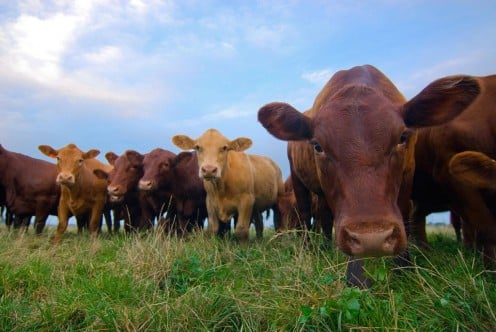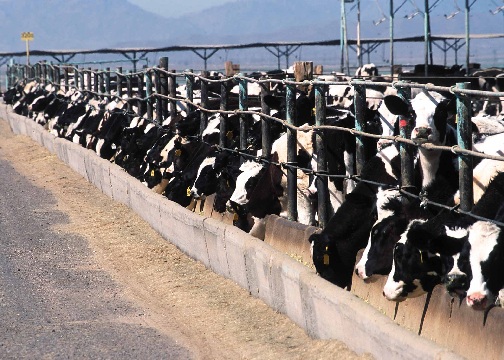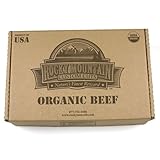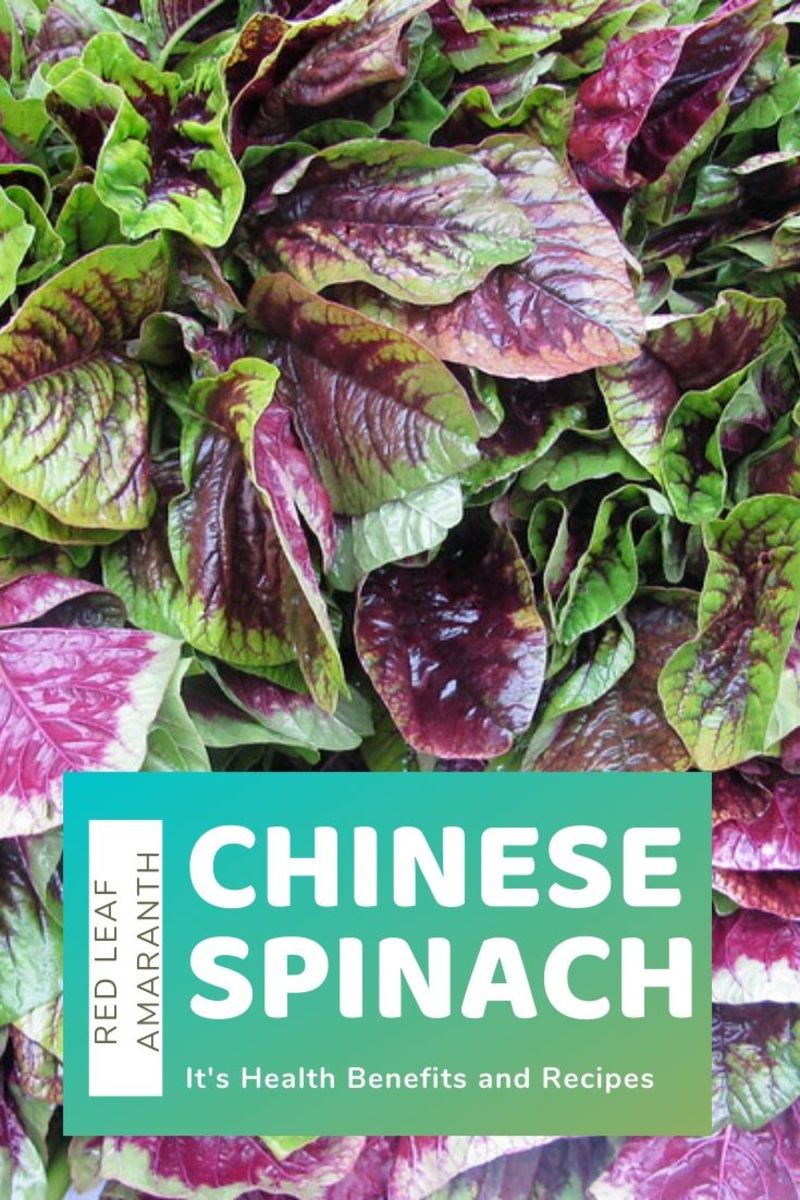Benefits of Organic Grass Fed Beef?
Organic Grass Fed Beef: Eat Green WIthout Going Vegetarian
Over the years, I have published a number of articles about how eating a vegetarian or vegan diet is best for the environment.
Yet, I am not 100% vegetarian myself.
There are probably a multitude of reasons for my retaining meat in my diet: my husband and my children top the list. Fortunately, I have discovered that you can eat green without going vegetarian!
Organic grass fed beef is a superior option for those that desire a healthy lifestyle with a minimal environmental impact. This, combined with a more minimal approach to meat consumption (try Meatless Mondays), can significantly reduce your energy consumption and carbon footprint.

Organic Grass Fed Beef is Greener
- Raising animals on pasture "spreads out" manure in a natural manner
- At a feedlot, cattle are crowded together and manure usually accumulates in excessive amounts. When rain washes over the piles, it contaminates the land, groundwater and surface water with polluting levels of nitrogen and phosphorus
- Feeding cattle (and other ruminant animals) a grass fed diet can reduce greenhouse gas emissions because cows are less gassy, emitting less methane, and because pastured farms are covered with grasses that - like trees - capture CO2 from the air via carbon sequestration. Factory farms cannot do that!
How is Organic Grass Fed Beef Different from its Counterparts?
The American Grassfed Association (AGA) defines grass-fed as:
"The AGA defines grass-fed products from ruminants, including cattle, bison, goats and sheep, as those food products from animals that have eaten nothing but their mother’s milk and fresh grass or grass-type hay from their birth till harvest."
If you are serious about making a healthy diet change, switching to organic grass fed beef from grainfed meat will make a difference.
1. Grass fed beef is 3 times leaner than grain-fed animals, which results in about 15 fewer calories per ounce (an ordinary serving size is 6 ounces), saving you nearly 100 calories per meal.
2. Grass-fed meat provides more balanced omega-3s and omega-6 fatty acids, 75% more than grain-fed meat, and 400% more Vitamin A. It also contains 78% more beta carotene and 300% more vitamin E than its counterparts.
3. Mad cow disease has never been found in grass-finished beef, and it is far less likely to contain dangerous E. coli bacteria.
4. You can be confident that you won't be ingesting extra hormones and antibiotics with grassfed beef. These animals eat "cleaner" than feedlot cattle, which often eat many other products in addition to grain, including chicken manure, cardboard, garbage waste, discarded bakery items, even candy and wrappers!
Health Differences Between Grain-Fed and Grass-Fed Beef
Grain-Fed Beef
| Grass-Fed Beef
| |
|---|---|---|
Calories (per 3 oz. serving)
| 212
| 162
|
Fat (grams per 3 oz. serving)
| 8.5
| 2.2
|
Vitamin E (mcg/gram)
| 1.5
| 6.9
|
Beta-carotene (ug/gram)
| .17
| .74
|
Ratio of Omega-6 to Omega-3 (ideal is 4:1 or lower)
| 14:1
| 2:1
|
The USDA Explains the Standards for Organic Grass Fed Beef
Organic Grass Fed Beef
Benefits of Organic Grass Fed Beef
Grass fed livestock are generally healthier than their grain-fed counterparts because they are eating a diet that nature intended for them.
In turn, organic grass fed beef is healthier for consumption:
- Steak from a grass fed steer is at least 33% lower in fat than that from a grain fed animal
- Grass fed beef is equivalent in fat as skinless chicken
- Lean meat can lower your LDL cholesterol levels
- Grass fed beef is lower in calories; you can save about 100 calories for the same 6-ounce cut from a grass fed steer, compared to a grain feed steer (over the course of a year, you could lose 6 pounds a year, if all other factors of your diet remain the same)
- Grassfed meat contains 2-6 times the amount of omega-3 fatty acids as other cuts, reducing your risk of a heart attack, and protecting against cancer, depression, schizophrenia, attention deficit disorder (hyperactivity), or Alzheimer's disease
- Even milk from grassfed cattle contains high amounts of conjugated linoleic acid (CLA), up to 5 times the amount of that from animals fed with conventional feed.
- CLA can prevent cancer growth; simply eating grass fed products each day (a glass of milk, one ounce of cheese or a serving of meat) can lower the risk of cancer; it possibly may have a regenerative role in improving the health of people suffering from chronic conditions
Advantages of Grass-Fed Beef

Demand for Healthier Meat Means a Closer Look at Factory Farms
Even though raising grass-fed animals is the traditional method of ranching, range livestock fell out of favor last century.
Once it was discovered that cattle could be more quickly fattened for market (and make the rancher more money) while on a grain-fed diet while corralled in small stalls, factory farms became the norm here in the United States.
In the past 10-15 years, however, consumers have demanded healthier meat and better quality beef. Also, documentaries such as Death on a Factory Farm have raised significant concerns about the practice of factory farming. As a result, in the decade between 1998-2009, grass-fed livestock producers in the U.S. grew from 100 to more than 2,000. Local market share exploded from $2 million to $380 million.
You can now find organic, grass fed meat at many specialty, as well as mainstream grocery stores. While conventional beef is less expensive, it does not taste as good, is significantly higher in fat and calories and lower in vitamins and nutrients than grass-fed.
Many people believe that, for the quality and health benefits, its worth it!
The Grass-Fed Difference
Organic Beef is not Necessarily Grass Fed Beef
When you go to the grocery store, be aware of labels! Meat labeled as "organic" need only have been raised on organically certified feed - including grass, hay or grain. In addition, the livestock must have had access to pasture and were not given antibiotics or hormones.
Importantly, rules for organic meat do not prohibit farmers or ranchers from feeding their livestock as much grain as they wish (provided its organic, of course). The more grain in the cattle's diet, the less you will enjoy the health benefits associated with grass fed beef set forth above.
The reverse is also true: grass-fed beef may not be organic. Where farmers or ranchers use herbicides on the pasture or hayfield to eradicate weeds that are either poisonous or that crowd out grasses, cattle can ingest the toxins as they eat.
Make sure that you are indeed purchasing organic grass fed beef. Some meat carrying a “grass-fed” label may nonetheless have been “finished” on grains at a feed lot. You can guard against this mislabeling by looking for a USDA “process verified shield” or a label from the American Grassfed Association.
Do You Enjoy Organic GrassFed Beef?
© 2012 Stephanie Marshall




